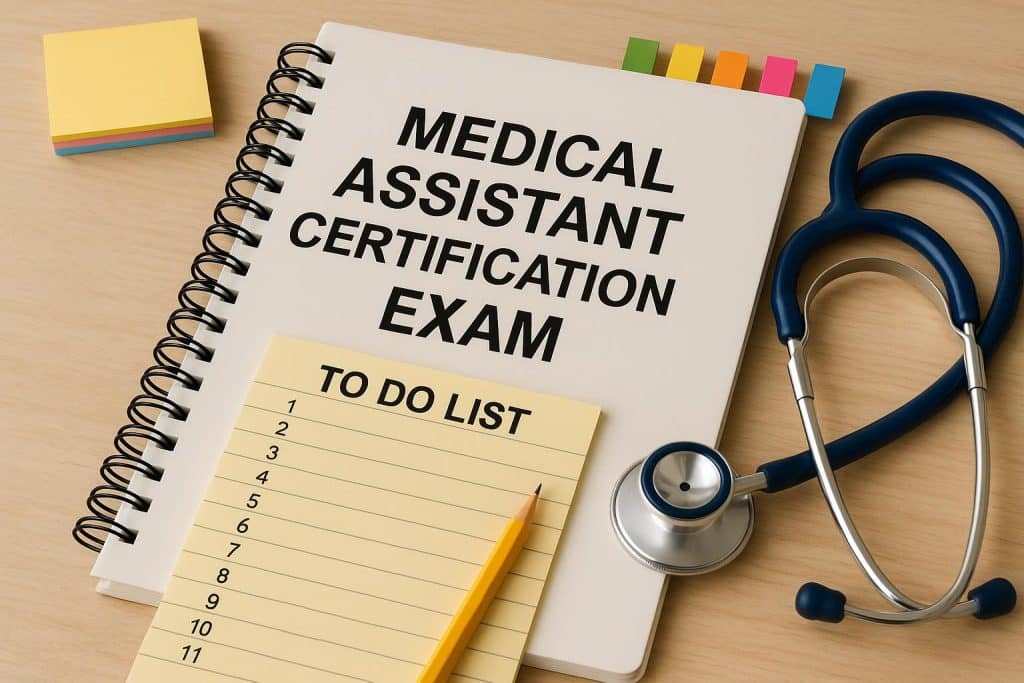Becoming a certified medical assistant (CMA) is a big milestone. But let’s be honest—the certification exam can feel overwhelming. The good news? With the right preparation, you can walk into the test center feeling confident and walk out with that passing score.
Here are ten practical, real-world tips to help you pass the Medical Assistant Certification Exam on your very first try.
1. Understand the Exam Format
Before you even crack open a book, take time to understand what the exam looks like. The test is multiple-choice and covers topics like clinical procedures, administrative tasks, and basic patient care. Knowing the structure helps you study smarter instead of just harder.
2. Make a Realistic Study Plan
Don’t try to cram everything into a week. Spread your study sessions out over several weeks or months. Create a schedule that breaks topics into smaller chunks. Even one hour a day can add up to a lot of progress if you stay consistent. If you’re balancing work or family, an online program such as a medical assistant certification online course can give you the flexibility to study on your own time.
3. Use Official Study Materials
There are countless resources online, but not all of them are accurate. Stick to trusted sources like the AAMA (American Association of Medical Assistants) study guide, practice exams, and flashcards. These materials are designed around the actual test.
4. Take Practice Tests Early
A lot of students wait until the end of their prep to take practice exams. That’s a mistake. Start early. Practice tests show you what areas you’re strong in—and where you need more work. Plus, they help you get comfortable with the pacing of the real test.
5. Focus on Weak Areas
It’s tempting to spend time reviewing the stuff you already know. But the fastest way to improve your score is to target your weak spots. If anatomy is tricky for you, spend extra time there. By test day, you’ll feel more balanced across all sections.
6. Don’t Just Memorize—Understand
Sure, flashcards are great, but don’t rely only on memorization. For example, instead of just remembering what an EKG does, understand why it’s performed. This deeper level of knowledge makes it easier to answer tricky scenario-based questions.
7. Study Actively, Not Passively
Reading notes over and over can get boring—and less effective. Try different study methods:
- Teach a concept to a friend.
- Draw diagrams.
- Record yourself explaining terms and listen back later.
Active learning sticks better than passive reading.
8. Take Care of Yourself
This might sound obvious, but it’s easy to forget: your brain works best when your body is taken care of. Get enough sleep, eat healthy meals, and stay hydrated. A tired, stressed-out brain doesn’t perform well on exam day.
9. Simulate Test Conditions
When you practice, do it under “exam conditions.” Sit at a desk, set a timer, and work without distractions. Training your brain in a similar environment reduces test-day anxiety and boosts your focus.
10. Stay Calm and Trust Your Preparation
The night before, avoid cramming. Get a good night’s sleep instead. On test day, breathe deeply, read each question carefully, and trust the work you’ve put in. Remember—you’ve prepared for this moment.
Final Thoughts
Passing the Medical Assistant Certification Exam on your first attempt isn’t about luck—it’s about preparation. If you create a solid study plan, use the right resources, and take care of yourself along the way, you’ll set yourself up for success.
Think of this exam as the final step toward an exciting career in healthcare. With the right mindset and preparation, you’ll not only pass but also start your new role with confidence. And if you’re looking for additional career options in healthcare, exploring a phlebotomy certification online can be another smart move to expand your skills.
Whether you choose a traditional study path or a medical assistant certification online course, the key is consistency and focus. With the right preparation, you’ll be ready to succeed on exam day—and beyond.
